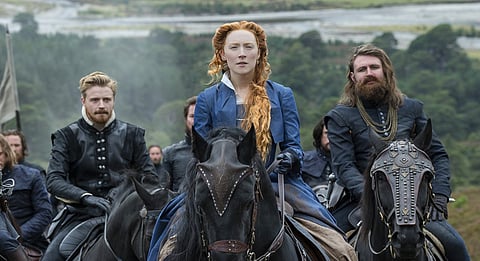
- In-Depth Stories
- Web Stories
- Reviews
- News
- FC Lists
- Interviews
- Features
- FC SpecialsFC Specials

Director: Josie Rourke
Cast: Saoirse Ronan, Margot Robbie, Jack Lowden
Mary Queen of Scots is a sumptuous tale of two cousins. Both are queens – one of England and one of Scotland. Elizabeth and Mary are kindred spirits but their relationship is strained by the power struggle between their two countries, between their two religions – Catholic and Protestant, and between the various ambassadors, emissaries and noblemen who flit in between their worlds. Every thing is consumed by the fight for the throne – even their bodies are part of the battleground. So in one scene, Mary haughtily declares, "I will be the woman she is not. I will produce an heir, unlike her barren self." And the fact that Mary has a son while Elizabeth does not alters the course of history.
This could have been the standard-issue stuffy costume drama but debutante director Josie Rourke infuses the narrative with vitality. Mary Queen of Scots, based on John Guy's book Queen of Scots: The True Life of Mary Stuart, begins in 1857 with Mary's execution and flashes back to when she arrived in Scotland from France as teenage widow. What follows is a full-bodied drama about two women who wield enormous power and yet are subjugated by men. I think the film benefits enormously by the female gaze that Rourke brings to the material. We see the women as contradictory, complex creatures who are driven by their hunger for love and power and sexual pleasure. In between battles and court intrigue, we get a scene in which Mary gets her period. Rourke wants us to know her that intimately.
It helps that Mary is played by Saoirse Ronan, a three-time Oscar nominee and easily one of the finest actors of her generation. Saoirse is at once, haughty and regal but also human and fragile. She has a lovely gentleness about her in the scenes with her maidens but she grows a steel spine when she is confronted by the men, most of whom are either using her or plotting to pull her down. At one point, a courtier asks another, "How did the world come to this? Wise men servicing the whims of women."
Margot Robbie as the wily and curdled Elizabeth makes for a strong frenemy. Robbie's startling beauty is lost here in prosthetics, pockmarks and blisters. Her look has won make-up artist Jenny Shircore an Oscar nomination. Her scarred face and determined eyes only add to her tragedy – Elizabeth sacrifices everything for her position. In one scene, she says, "I am more man than woman now – the throne has made me so."
The two-hour-long film does require patience. But there is enough juice here to keep you hooked
The film is beautiful to look at with sweeping Scottish landscapes and dark, brooding castles. Rourke seems to like theatricality so when the two queens finally meet, the face-to-face conversation is delayed and made more dramatic by cloth screens that divide them. This meeting is fiction – in reality, the two never met – but it is electric. If it wasn't for all those power-hungry and insecure men in between them, the film seems to suggest, these two could have been allies and ruled the world.
I'm not sure why historical subjects cause directors to make long films. Last week, we saw the nearly three-hour-long Manikarnika: The Queen Of Jhansi. This one is two but feels longer. So it does require patience. But there is enough juice here to keep you hooked. I'm going with three stars.